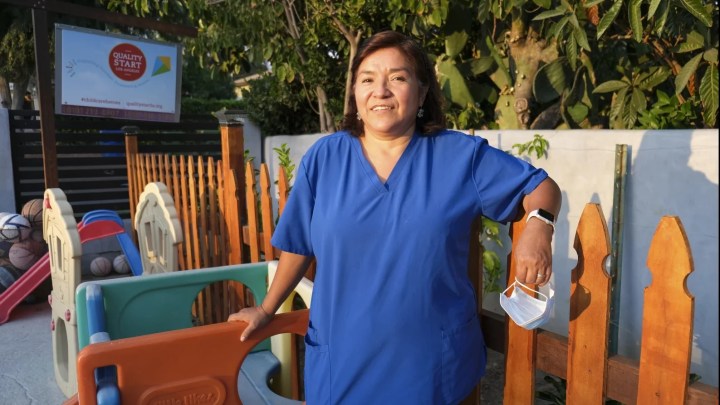
Apprenticeships may help build the child care workforce

Apprenticeships have traditionally focused on male-dominated jobs in trades like construction, electrical and plumbing, fields with above-average wages. But a handful of states are now certifying apprenticeships in early childhood education, including California.
“It’s not just about getting more college credit. It’s not just about getting a raise. It’s not just about advancing from one position to another,” said Randi Wolfe, executive director of the nonprofit Early Care & Education Pathways to Success. “It pulls it all together … in one nice package.”
Wolfe helped establish a program where Los Angeles early educators earned teaching certificates — and as a result, higher wages — in 2016. Participants received stipends for finishing college coursework, free textbooks and computers.
“We set up a program that’s going to meet the needs of first-generation college students, of working-full-time mothers,” Wolfe said.
More than 350 people completed early childhood educator apprenticeships between 2016 and 2019, including family child care provider Carmen Del Alamo.
She was a nurse in Peru before moving to Los Angeles and opening her child care home more than 10 years ago. Del Alamo said she wanted to go back to college sooner, but the daytime classes didn’t fit her schedule and she could’t really afford them.

A quick tour of her home showed how she’s put her child development training into action. There are areas for science, math and music and another where toddlers can practice fine motor skills like zipping zippers, buttoning buttons and closing latches.
Del Alamo said the kids’ emotions are central to her program. A crying child warrants more than “Shhhh” or “Please, be quiet.”
“They’re crying for something,” Del Alamo said. “You need to validate their feelings. It’s really important.”
Del Alamo earned her teaching certificate in 2019 and aspires to complete a bachelor’s degree and open a stand-alone child care center one day.
“I [am] really como se dice agradecida — grateful,” Del Alamo said.
There are now four distinct early childhood apprenticeships with about a dozen cohorts spread throughout California, and more on the way.
But pay is stubbornly low, even for well-qualified early educators. The median wage for child care workers nationwide is $11.65 an hour. Preschool teachers make about $14.67, according to the Center for the Study of Child Care Employment at the University of California, Berkeley.
“In many fields, you can expect to earn significantly higher wages as you meet significant milestones like degrees,” said the center’s research director, Abby Copeman Petig. “That’s not always the case with early education.”
Wolfe said California’s child care apprenticeship programs are largely supported by philanthropy, with some public funding. She points out to donors that the shortage of early childhood educators has a ripple effect.
“Ignore us at your own peril,” Wolfe said she tells donors. “Because if you don’t have child care … in your community, how do you think these electricians are going to go to work? How do you think these advanced manufacturers are going to go to work?”
Research shows child care employment nationwide is still 10% lower than before the pandemic.
One of California’s newest apprenticeship programs aims to expand the workforce by enrolling high school juniors in college courses and placing them in summer child care jobs. The end goal is an associate degree, a child development credential and paid on-the-job training.
Cara Sklar, deputy director for early and elementary education policy at the think tank New America, evaluated the beginnings of a youth apprenticeship in Oakland, California, before the pandemic and found promise, but also potential pitfalls.
“It’s important to acknowledge concerns about the equity implications of creating career pathways for high school students, particularly young women of color from families with low incomes and also immigrant youth, to work in the undervalued and low-paying field of early ed,” Sklar said.
And apprenticeships alone can’t boost wages in the field, she said.
“Families cannot pay more, and then providers cannot pay their teachers more,” Sklar said. “Until new federal, state, local dollars come in, until new public dollars come in, we are stuck with low compensation. But we don’t have to be.”
There’s a lot happening in the world. Through it all, Marketplace is here for you.
You rely on Marketplace to break down the world’s events and tell you how it affects you in a fact-based, approachable way. We rely on your financial support to keep making that possible.
Your donation today powers the independent journalism that you rely on. For just $5/month, you can help sustain Marketplace so we can keep reporting on the things that matter to you.

















